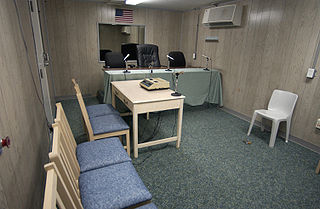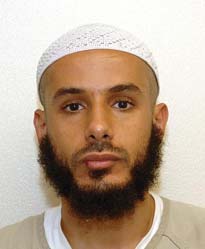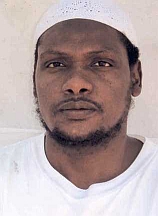Rasul v. Bush, 542 U.S. 466 (2004), was a landmark decision of the United States Supreme Court in which the Court held that foreign nationals held in the Guantanamo Bay detention camp could petition federal courts for writs of habeas corpus to review the legality of their detention. The Court's 6–3 judgment on June 28, 2004, reversed a D.C. Circuit decision which had held that the judiciary has no jurisdiction to hear any petitions from foreign nationals held in Guantanamo Bay.

The Combatant Status Review Tribunals (CSRT) were a set of tribunals for confirming whether detainees held by the United States at the Guantanamo Bay detention camp had been correctly designated as "enemy combatants". The CSRTs were established July 7, 2004 by order of U.S. Deputy Secretary of Defense Paul Wolfowitz after U.S. Supreme Court rulings in Hamdi v. Rumsfeld and Rasul v. Bush and were coordinated through the Office for the Administrative Review of the Detention of Enemy Combatants.
Asif Iqbal is a British citizen who was held in extrajudicial detention as a terror suspect in the United States Guantanamo Bay detainment camps in Cuba from early 2002 to March 9, 2004.

Shaker Aamer is a Saudi citizen who was held by the United States in the Guantanamo Bay detention camp in Cuba for more than thirteen years without charge.
Bisher Amin Khalil Al-Rawi is an Iraqi citizen, who became a resident of the United Kingdom in the 1980s. Arrested in Gambia on a business trip in November 2002, he was transferred to United States military custody and held until 30 March 2007, in extrajudicial detention in the United States Guantanamo Bay detention camp at its naval base in Cuba. His Guantanamo Internment Serial Number was 906. The Department of Defense reports that Al Rawi was born on 23 December 1960, in Baghdad, Iraq.

Fouzi Khalid Abdullah al Odah is a Kuwaiti citizen formerly held in the United States Guantanamo Bay detainment camps, in Cuba. He had been detained without charge in Guantanamo Bay since 2002. He was a plaintiff in the ongoing case, Al Odah v. United States, which challenged his detention, along with that of fellow detainees. The case was widely acknowledged to be one of the most significant to be heard by the Supreme Court in the current term. The US Department of Defense reports that he was born in 1977, in Kuwait City, Kuwait.
Jamal Udeen Al-Harith, born Ronald Fiddler, also known as Abu-Zakariya al-Britani, was a British citizen who reportedly died carrying out a suicide bombing in Iraq in February 2017.
Abu Bakker Qassim is a Uyghur from China's western frontier, Xinjiang Uyghur Autonomous Region who was held in the United States Guantanamo Bay detention camps, in Cuba. His Guantanamo Internment Serial Number was 283.
Muhibullah or Moheb Ullah Borekzai is a citizen of Afghanistan who was held in extrajudicial detention in the United States's Guantanamo Bay detention camps, in Cuba. His Guantanamo Internment Serial Number was 546. American intelligence analysts estimate that Muhibullah was born in 1982, in Shah Wali Koot, Afghanistan.
Extrajudicial prisoners of the United States, in the context of the early twenty-first century War on Terrorism, refers to foreign nationals the United States detains outside of the legal process required within United States legal jurisdiction. In this context, the U.S. government is maintaining torture centers, called black sites, operated by both known and secret intelligence agencies. Such black sites were later confirmed by reports from journalists, investigations, and from men who had been imprisoned and tortured there, and later released after being tortured until the CIA was comfortable they had done nothing wrong, and had nothing to hide.
The Tipton Three is the collective name given to three British citizens from Tipton, England who were held in extrajudicial detention by the United States government for two years in Guantanamo Bay detainment camp in Cuba.

Ali Ahmad Muhammad Al Rahizi is a citizen of Yemen who was held in extrajudicial detention in the United States Guantanamo Bay detainment camps, in Cuba. His Guantanamo Internment Serial Number is 45. Joint Task Force Guantanamo counter-terrorism analysts reports he was born on October 13, 1979, in Taiz, Yemen.
Al Odah v. United States is a court case filed by the Center for Constitutional Rights and co-counsels challenging the legality of the continued detention as enemy combatants of Guantanamo detainees. It was consolidated with Boumediene v. Bush (2008), which is the lead name of the decision.
In United States law, habeas corpus is a recourse challenging the reasons or conditions of a person's detention under color of law. The Guantanamo Bay detention camp is a United States military prison located within Guantanamo Bay Naval Base. A persistent standard of indefinite detention without trial and incidents of torture led the operations of the Guantanamo Bay detention camp to be challenged internationally as an affront to international human rights, and challenged domestically as a violation of the Due Process Clause of the Fifth and Fourteenth amendments of the United States Constitution, including the right of petition for habeas corpus. In 19 February 2002, Guantanamo detainees petitioned in federal court for a writ of habeas corpus to review the legality of their detention.

Mohammed Abdul Malik Bajabu is a citizen of Kenya currently held in extrajudicial detention in the United States' Guantanamo Bay detention camps, in Cuba. He was born in Busia, Uganda in 1973, but has Kenyan citizenship. Abdul Malik was captured in February 2007, on suspicion of leading a terrorist bomb-plot in Mombasa. He was transferred to Guantanamo on 26 March 2007. Abdul Malik is a confirmed member of the East Africa al-Qaeda network as well as a confirmed member of the Council of Islamic Courts and the Islamic Part of Kenya. He "actively participated" in the facilitation of weapons and the planning of terrorist acts against the U.S., according to the Joint Task Force (JTF) at Guantanamo Bay. He was recommended for continued detention under the Department of Defense's control. The JTF gave Abdul Malik a high risk threat against the United States' interests and allies. He has no reports of disciplinary infractions as of May 22, 2007, granting him a low detention risk value. Abdul Malik does, however, have a high intelligence value.





